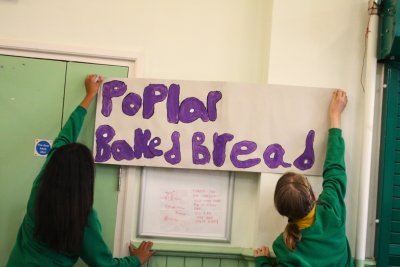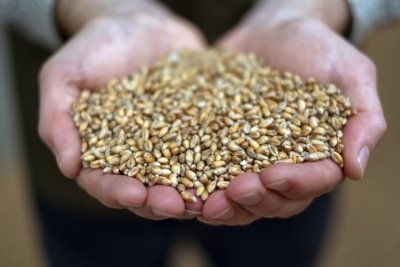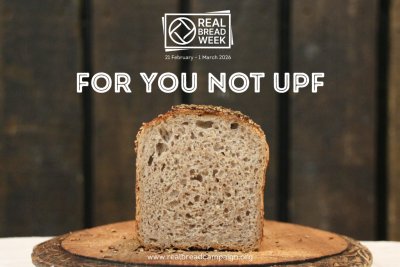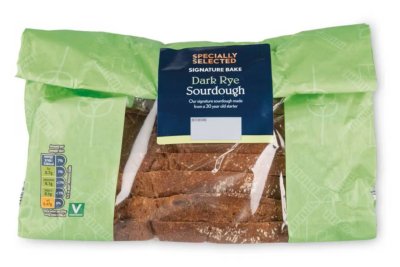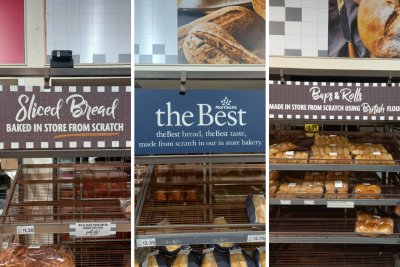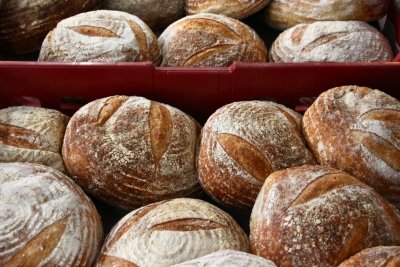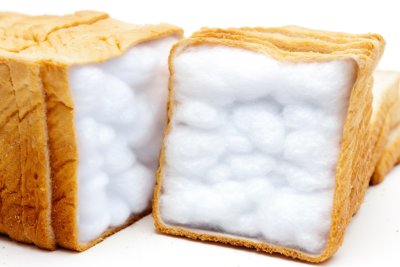 UPF crust, AI crumb. Credit: Canva / Chris Young / www.realbreadcampaign.org CC-BY-SA-4.0
UPF crust, AI crumb. Credit: Canva / Chris Young / www.realbreadcampaign.org CC-BY-SA-4.0
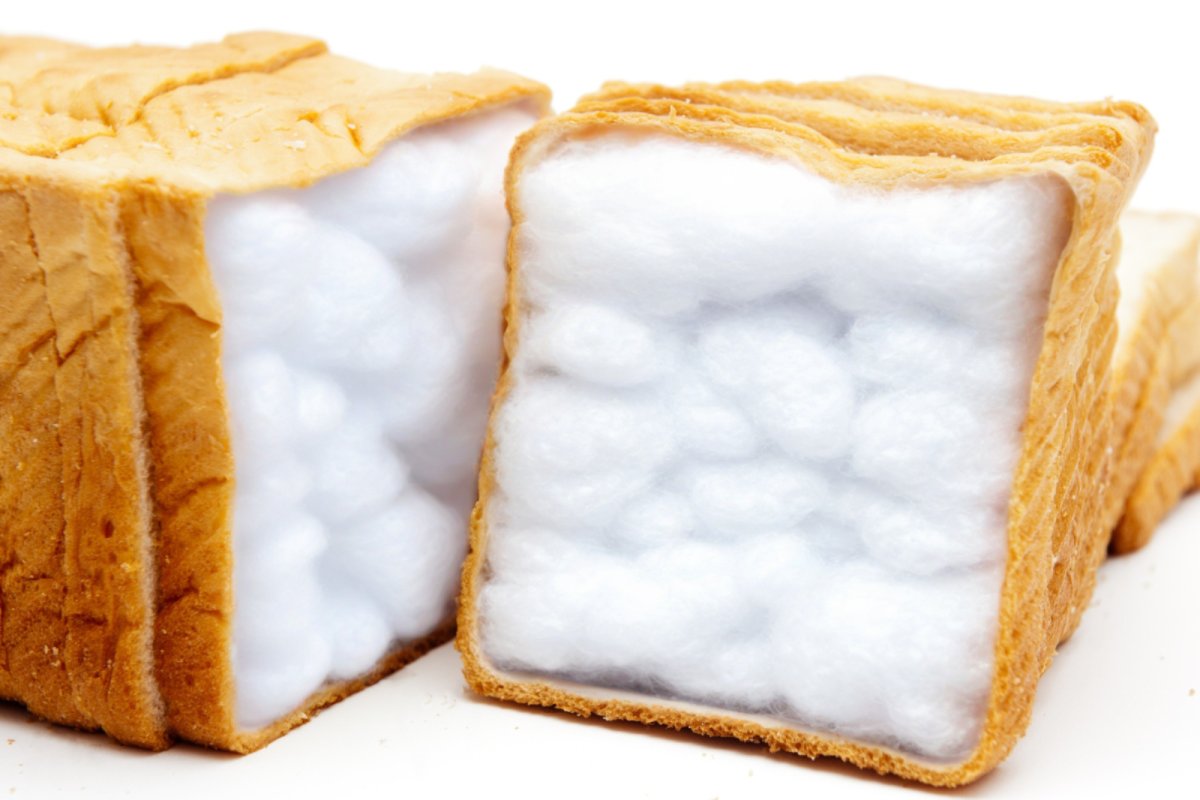
Words ‘woolly as white-sliced’
Real Bread Campaign reacts to supermarket loaf pricing responses
- ‘More robust’ packaging.
- ‘Dynamic in nature’
- ‘More stringent quality controls’
- ‘The process that it takes and the items used’
- ‘Retail price inflation elsewhere in the market’
- ‘A unique tiger paste topping’
These are amongst the attempts by UK supermarkets to explain (or not) the reasons for their differential pricing of apparently alike own-brand white-sliced Chorleywood Process loaves.
Jump to updates
The investigation
The Real Bread Campaign looked at the prices of large, wrapped, white-sliced factory loaves manufactured by / for the UK’s 10 largest supermarket chains. The research revealed that price differences within a retailer’s own brand range exceeded 200% in some cases.
On 29 April 2025, the Campaign contacted the companies by email, or online form.
Campaign coordinator Chris Young was far from impressed with the responses: ‘Through some of the companies' replies were quick, to me their words generally seemed woolly as white sliced.'
He added 'Even one of the more detailed replies suggests that “more robust” packaging might be a factor in the difference between a “basic” and “premium” loaf price. I have no idea how a few extra microns in polythene bag thickness justifies charging three times the price.’
Responses
Below are extracts from our correspondence with the 10 chains, up to 5 May 2025. The Campaign continues to follow up with the companies that have not yet replied, and those that have failed to answer to the question adequately.
Aldi
7 May 2025: Aldi replied: 'We only raise our prices if we really have to. Which? announced that we are the UK's cheapest supermarket and it's true! Our aim is to offer the lowest grocery prices in the UK, so you can always expect to pay less at Aldi than other supermarkets.'
We responded: 'Thanks, but you misunderstood the question, which is: why does Aldi charge massively different prices for near-identical own-brand products?
The Village Bakery Soft Medium White costs over 50% more than the Everyday Essentials White, and the Village Bakery Traditional Tiger Bloomer is nearly three times the price of the Everyday Essentials White.
Is this a case of the Everyday Essentials White being sold below cost of production as a loss leader, with a large profit margin being added to the Traditional Tiger Bloomer?'
6 May 2025: Aldi replied: 'I have reached out to the relevant team. The moment we get feedback, we will reach out to you with feedback.'
2 May 2025: Aldi replied: ‘We cannot accommodate this request because our system contains thousands of codes and barcodes. We need you to specify the exact product codes you're interested in; a broad search isn't possible. Additionally, all ingredients are clearly printed on the product packaging.’
We responded by specifying three products, highlighting that we had already done so in previous emails, and have also been clear that we are having to ask because we do not have easy access to a store to check packaging, and Aldi chooses not to publish ingredients on its website. We added that it seems unlikely that, on its own, an ingredients list will fully answer the question.
Aldi replied: 'The price variations are primarily due to differences in ingredients, production methods, and the overall quality and texture of the bread. The Everyday Essentials White loaf is designed to be a budget-friendly option, providing basic quality at an affordable price. The Village Bakery Soft Medium White loaf, while still reasonably priced, offers a softer texture and slightly higher quality ingredients. The Traditional Tiger Bloomer, on the other hand, is crafted using a more intricate baking process, which includes a unique tiger paste topping that gives it a distinctive flavor and texture, justifying its higher price.'
30 April 2025: ‘Thank you for contacting us with your question about the price differences between our 'value', 'standard', and 'premium' sliced loaves. We appreciate you taking the time to share your concerns.
First and foremost, we apologise for any confusion or frustration this may have caused. We understand how important it is to get value for your money, and we want to ensure you have a clear understanding of our pricing.
While it's true that all our loaves are mass-produced using the Chorleywood Process, there are several factors that contribute to the price differences:
- Ingredients: Our 'premium' loaves often contain higher-quality ingredients, such as organic flour or speciality grains, which can increase the cost.
- Production Costs: The 'standard' and 'premium' loaves may involve additional steps or more stringent quality controls during production.
- Packaging: The packaging for 'premium' loaves is usually more robust and designed to keep the bread fresher for longer.
- Market Positioning: Pricing also reflects the market positioning and target audience for each product line.
We hope this helps clarify the reasoning behind the price differences. Your feedback is incredibly valuable to us, and we've logged it into our system for an internal review. We are always looking for ways to improve and ensure our customers are satisfied.’
We responded: ‘What are the specific differences that justify Aldi pricing the Everyday Essentials White loaf at 49p, the Village Bakery Soft Medium White at 74p, and Village Bakery Traditional Tiger Bloomer at £1.45 – almost three times the price of the ‘Everyday Essentials’ loaf?’
ASDA
6 May 2025: Asda responded: 'We are not going to be providing you with the specific differences between every one of our products as, like I say, the differences in price reflect the differences in ingredients, manufacturing process and packaging.'
2 May 2025: Asda replied ‘I feel we have answered your questions fulsomely. They are priced differently because they are different products. Examples of the differences are laid out in this line of the response: "The differences between Asda's own brand products can be across multiple elements, including ingredients, manufacture and packaging."’
We pointed out 'You have repeated a general response to a very specific question. ‘Can be across multiple elements’ does not answer the question: What specific difference in production costs justify the ‘exceptional’ product being more than three times the price of the ‘essentials’ one?'
1 May 2025: An Asda spokesperson replied: ‘The differences between Asda's own brand products can be across multiple elements, including ingredients, manufacture and packaging. This is reflected in our own brand bakery products as they are across every category both within our stores and our competitors.’
We countered with: ‘Why is JUST ESSENTIALS by ASDA White priced at 49p, The BAKERY at ASDA Soft White Medium Sliced at 74p and Exceptional by ASDA White Farmhouse Loaf at £1.50, when they are near-identical products manufactured by the same process at the same scale? What difference in production costs justify the ‘exceptional’ product being more than three times the price of the ‘essentials’ one?’
The Co-op
9 May 2025: We chased the company for a reply.
Iceland
1 May 2025: Iceland replied: ‘There is a difference in the formulation between the 2 breads as items are priced on the process that it takes and the items used which means that each bread will be created using different ingredients, methods and processes resulting in different prices from item to item.’
We responded: 'What are the specific differences that account for Iceland charging 60% more for The Daily Bakery Thick Sliced White Bloomer than the Iceland Thick Sliced Soft White?
Our understanding is that the products are both manufactured by the Chorleywood Process, which leaves the ingredients. Both are manufactured using 'Fortified' Wheat Flour, Water, Yeast, Salt, Calcium Propionate and Ascorbic Acid. They differ in the addition of the following ingredients and additives:
- The Daily Bakery Thick Sliced White Bloomer: Soya Flour, Mono- and Diglycerides of Fatty Acids and Mono- and Diacetyl Tartaric Acid Esters of Mono- and Diglycerides of Fatty Acids
- Iceland Thick Sliced Soft White: Rapeseed Oil, Fermented Wheat Flour, Wheat Semolina, Wheat Flour, Dextrose, Calcium Sulphate, Citric Acid; Wheat Sourdough and Wheat Starch
How do these minor differences justify major difference in price, or is there something we have missed?’
Lidl
1 May 2025: ‘Lidl has several different suppliers for our products and each item has its own specifications. We therefore unfortunately can't provide a general response to your enquiry at this time. However, if you are able to provide the details/barcode for specific products, we will be able to enquire this with the relevant supplier and give you the correct information for each item.’
We replied, noting that as Lidl chooses to provide very little information on its website, the company will have a better idea than us of the products it offers. 'Please advise the specific differences that account for differences in prices between an 800g white sliced loaf from your ‘Simply’ and ‘Rowan Hill’ ranges, plus one from your ‘Deluxe’ range, or otherwise at a at a higher pricing tier – if Lidl offers one.'
M&S
3 May 2025: M&S replied: 'We truly appreciate your interest in our products and your loyalty to M&S. I understand how important it is to have detailed information about the food you enjoy. As the customer service team, we don't have the specific fermentation times to hand, but I have reached out to our food technologist for the precise details. As soon as I receive their response, I will contact you with the information.
Your patience and understanding are greatly valued, and we are committed to providing you with the best possible service. Thank you for choosing M&S, and we look forward to assisting you further.'
1 May 2025: M&S replied ‘I truly appreciate your loyalty to M&S and your keen interest in our products. I understand your concerns and want to assure you that we value transparency and customer satisfaction. Both of these breads are indeed produced using the Chorleywood Process, which allows for efficient dough production and a soft, fluffy texture
However, there are several factors that contribute to the price difference between these two products. Firstly, our 'Super Soft Loaf' is crafted with the highest quality white flour and enriched with vitamin D and fibre, making it an exceptionally soft and nutritious choice On the other hand, the 'Soft White Farmhouse' loaf is made using a traditional sponge process, which involves a longer fermentation time and results in a distinct texture and flavour. Additionally, 5p from the sale of every 'Soft White Farmhouse' loaf is donated to Young Minds, supporting young people's mental health
We strive to offer a variety of products to meet different tastes and preferences, and we hope this explanation helps clarify the reasoning behind the price difference. Your feedback is invaluable to us, and we are committed to continuously improving our offerings to better serve our customers.’
Morrisons
3 June 2025: Morrisons replied 'Please be advised that as per the updates from our buyer, we price the products as competitively as we can.'
23 May 2025: Morrisons wrote: 'Thank you for your patience on this matter. Please be advised that we are working on your query and once we have any updates on this matter then I'll share with you on the same email.'
6 May 2025: Morrisons wrote: 'Please be advised that I have noted your feedback and will highlight this further with our internal team so it can be looked further. Once we have any further updates then I'll share with you on the same email.'
2 May 2025: Morrisons wrote ‘I would like to inform you that the price are dynamic in nature and may vary from product to product according to the marketing demand of the products however your feedback is valuable to us. Please be advised that I have noted your feedback and will highlight this further with our marketing team so it can be looked further.’
We replied: ‘You refer to dynamic pricing, a system in which a price is raised when demand increases and / or supply decreases, and vice versa.
Do you therefore mean that Morrisons currently charges 28% more for the Morrisons White Farmhouse than for the Morrisons White Medium Sliced because demand is higher and supply is more limited for the former than the latter?’
Sainsbury’s
29 April 2025: A Sainsbury's online chat advisor wrote: 'The difference of the prices is because of the different costing for the raw materials that was used for the different items.'
We pointed out that the cost of ingredients is pence and even if different flours are used, the difference in prices with be minimal, but the ‘Taste The Difference’ loaves are priced at 185% more than the Stamford St. one.
The advisor wrote’ I apologise but I cannot give you a specific answer for the costing of the products.’ The advisor supplied a phone number, declined to give an email address, then wrote ‘I apologise but I'll be needing to end the conversation now. Have a wonderful day, bye for now.’
Tesco
9 May 2025: We chased the company for a reply.
Waitrose
3 May 2025: Waitrose replied 'Unfortunately, the information you have requested is commercially sensitive, so I am unable to share specific details.'
2 May 2025: Waitrose replied ‘While we do welcome enquiries from our customers, I'm afraid in this case we can’t provide you with the information you've asked for.’
We asked: 'Why the secrecy? Is it because there is more or less no difference in costs that could justify the large percentage differences between their prices?'
1 May 2025: ‘In part this is due to cost price inflation and in response to retail price inflation elsewhere in the market including suppliers. You may also see changes made by suppliers in the products including multi-pack sizes to help keep prices to a minimum to not impact our customers too much.
We always look to remain competitive in the market. Nevertheless, current market pressures will result in price changes for some products. As always, value is a balance between quality, price, and service. We believe that all are mass-produced by the Chorleywood Process, and there is little difference between their formulations.
We do welcome enquiries from our customers, but I'm afraid in this case we can’t provide you with the information you've asked for. I do apologise for this, but I hope the above explanation was helpful.
‘Why is the Essential White loaf priced at 75p, the Waitrose Super Soft White at £1.00 and the Waitrose Soft White Farmhouse at £1.50? What are the specific differences in ingredients, process or scale of manufacture that justify the Soft White Farmhouse costing 50% more than the Super Soft White and 100% more than the Essential White?’
Real Bread Campaign: Finding and sharing ways to make bread better for us, our communities and planet.
Sustain
The Green House
244-254 Cambridge Heath Road
London E2 9DA
020 3559 6777
sustain@sustainweb.org
Sustain advocates food and agriculture policies and practices that enhance the health and welfare of people and animals, improve the working and living environment, promote equity and enrich society and culture.
© Sustain 2026
Registered charity (no. 1018643)
Data privacy & cookies
Icons by Icons8
